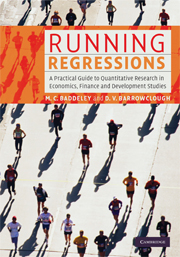 Running Regressions
Running Regressions Book contents
- Frontmatter
- Contents
- List of figures
- List of tables
- List of boxes
- Acknowledgements
- List of acronyms
- How to use this book
- Part I Simple regression and data analysis
- Part II Multiple regression and diagnostic testing
- Part III Time-series econometrics
- 9 Structural breaks, non-stationarity and spurious regressions
- 10 Error correction models
- Part IV Advanced topics
- Index
- References
10 - Error correction models
Consumption and the multiplier in the UK
Published online by Cambridge University Press: 05 June 2014
- Frontmatter
- Contents
- List of figures
- List of tables
- List of boxes
- Acknowledgements
- List of acronyms
- How to use this book
- Part I Simple regression and data analysis
- Part II Multiple regression and diagnostic testing
- Part III Time-series econometrics
- 9 Structural breaks, non-stationarity and spurious regressions
- 10 Error correction models
- Part IV Advanced topics
- Index
- References
Summary
Economic issues include:
Marginal and average propensities to consume
The multiplier
Permanent income hypothesis and life-cycle hypothesis
Econometric issues include:
Autoregressive distributed lag (ARDL) models
Error correction models (ECMs) and cointegration
Granger causality tests
Data issues include:
Using lags
The issue
When income rises do we spend more or save more? This question most famously excited the interest of the British economist, John Maynard Keynes (1883–1946) during the depression years of the 1930s, but it is of equal importance today. Consumption is the single largest element in household spending and has significant implications for demand and the subsequent health of the economy. Recognition of this role of household spending was evident in the flurry of newspaper articles in late 2001 and early 2002, when many commentators feared the world was headed for recession, if not a complete depression. ‘The shoppers who saved the nation’ was a typical headline in 2005: journalists who had previously expressed shock at the high debt held at stores and on credit cards by the average household, now applauded the fact they were continuing to spend and thereby maintaining the multiplier effects that might ward off the nation's – and indeed the world's – slide into recession. Policy-makers struggled to estimate precisely the extent to which an extra dollar's spending would trickle through the economy to keep the country's producers, manufacturers and retailers afloat.
Information
- Type
- Chapter
- Information
- Running RegressionsA Practical Guide to Quantitative Research in Economics, Finance and Development Studies, pp. 225 - 246Publisher: Cambridge University PressPrint publication year: 2009